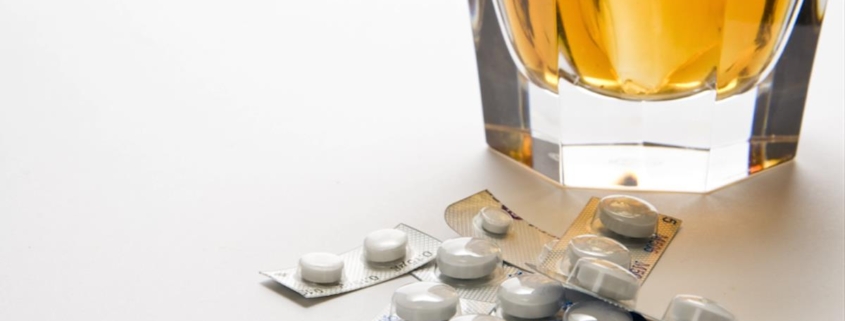Abusing Adderall and Alcohol
Table of Contents
Mixing Substances and The Consequences
Substance abuse involving the combination of Adderall and alcohol has become widespread, especially among college-aged young adults. This age group gravitates to using Adderall as a study aid, as its stimulant effects help them manage their course load.
As a means of enhancing the high, some will combine the Adderall with alcohol, which can have serious consequences. To learn more about the risks of Adderall and alcohol misuse, read on.
What is Adderall?
Adderall is the brand name for a combination of two medications, amphetamine and dextroamphetamine. The stimulant drug is often used to treat attention deficit hyperactivity disorder (ADHD) and narcolepsy. When used by these patients, Adderall does not produce the stimulant effects that are common when someone misuses it recreationally.
Young adults seek Adderall because of the drug’s stimulant action on the central nervous system. As with other stimulants, Adderall produces euphoria, a sense of heightened alert, a boost in energy, weight loss, and less need for sleep. Because the brain’s reward system records these desired effects, users are prompted to repeat the Adderall again and again. This can result in addiction.
Effects of Mixing Adderall and Alcohol
When young people decide to drink while taking Adderall, they are likely seeking to enhance an evening of partying. This combo of substances is widely misused in the 18-24 year old cohort. By taking Adderall, they are able to drink more alcohol, a depressant, without becoming drowsy.
Most of the time, these young adults are not aware of the inherent risks involved with mixing Adderall and alcohol. In fact, these drugs do not interact well in the body, and can hide the effects of each other. This can lead to overdosing on either the alcohol or the Adderall. In addition, combining these drugs can cause serious health effects, such as heart and lung problems, heart failure, overheating, and kidney failure.
Signs of Adderall Abuse or Addiction
Those who use Adderall off label consistently will find that they become more tolerant to the drug’s effects. This means that the person will need to increase their dosing to achieve the earlier result. This is what sets up the table for addiction.
Signs of Adderall abuse may include:
- Irritability
- Nervous
- Jittery
- Dizzy
- Decreased appetite and weight loss.
- Insomnia
- Hoarse voice.
- Impulsive behavior.
- Anxiety
- Headaches
- Nausea
- Diarrhea
- Excessive fatigue.
- Dry mouth.
- Shortness of breath.
Signs of Alcohol Use Disorder
Alcohol use disorder (AUD) includes abuse, dependence, and addiction. A diagnosis of mild, moderate or severe AUD depends on the number of criteria the person presents with. Consistent heavy drinking will eventually result in alcohol addiction or dependency. Symptoms of alcohol use disorder include:
- Increased tolerance.
- Decline in school or work performance.
- Tries to quit or cut down on drinking but can’t.
- Aggressive behaviors.
- Isolating behaviors, drinking alone more often.
- Memory blackouts.
- Neglects obligations.
- Acute hangovers.
- Obsesses about next drinking experience.
- Legal problems, such as a DUI arrest.
- Withdrawal symptoms.
What is Poly-Substance Addiction?
When someone misuses multiple substances it can lead to what is called a poly-substance addiction. This type of substance use disorder is much more complex than if there is just one substance involved. Each of the substances affect the brain and body in a unique way, and when combined it could lead to complications.
When it’s time to seek support for a poly-substance use disorder you should seek a program with this expertise. These programs design the detox and treatment plan to address both the Adderall and alcohol.
Dangers of Abusing Alcohol and Adderall
Those who combine these substances may not be aware of the dangers of Adderall and alcohol when used together. The unpredictable effects of combining alcohol and Adderall can be very risky. Here are some of the negative effects of mixing these two substances:
- Overdose. This can occur because you lose awareness of how much Adderall or alcohol you have consumed. The full effect of each substance is somewhat muted. Adderall can mask the effects of the alcohol, and alcohol can mask the effects of the Adderall. This can lead to excessive consumption and an overdose.
- Seizures. When Adderall and alcohol are used together, there is an increased risk for seizure, stroke, rapid heart rate, and heart attack.
- Adverse effects. The Adderall/alcohol combination can cause convulsions, heart palpitations, overheating, and tremors.
- Injuries. Impairment caused by the alcohol may not be recognized, possibly leading to an accident or injury.
- Impulsive actions. The effects of both substances can impede the ability to reason or make sound judgments, possibly leading to dangerous behaviors. These behaviors might include driving under the influence, unsafe sex practices, illegal acts, or violence.
- Psychosis. Abusing both these substances can trigger symptoms of psychosis or hallucinations.
- Poly-substance addiction. Continued use of both Adderall and alcohol increases the risk of a poly-substance addiction.
Detox for Adderall and Alcohol
If you are ready to enter treatment, your first step will be to purge both substances from your system A poly-substance use disorder that is moderate or severe will require a supervised medical detox.
Residential detox will be closely monitored, with vital signs and symptoms watched throughout the process. The detox team makes every attempt to reduce any discomforts during the detox. In addition to the physical withdrawal symptoms, there is likely to be psychological symptoms that emerge during the detox. Support is provided for these symptoms as well.
Treatment for Adderall and Alcohol Addiction
A residential rehab setting provides a structured retreat that is conducive to healing from an Adderall or alcohol addiction. Young adults will recover in a substance-free setting and learn new coping tools to access while at college. These stress reduction skills will be key to achieving a lasting recovery without the need of Adderall or alcohol.
Treatment includes:
- Psychotherapy
- Group counseling
- Family therapy
- 12-step program
- Holistic methods
If your use of Adderall and alcohol has escalated, please reach out for help today.
Residential Addiction Treatment in California
Annandale Behavioral Health offers the most current and effective treatment modalities for individuals struggling with addiction. If you are addicted to prescription stimulants and/or alcohol, our team is here for you. For immediate assistance, please reach out today at (855) 778-8668







